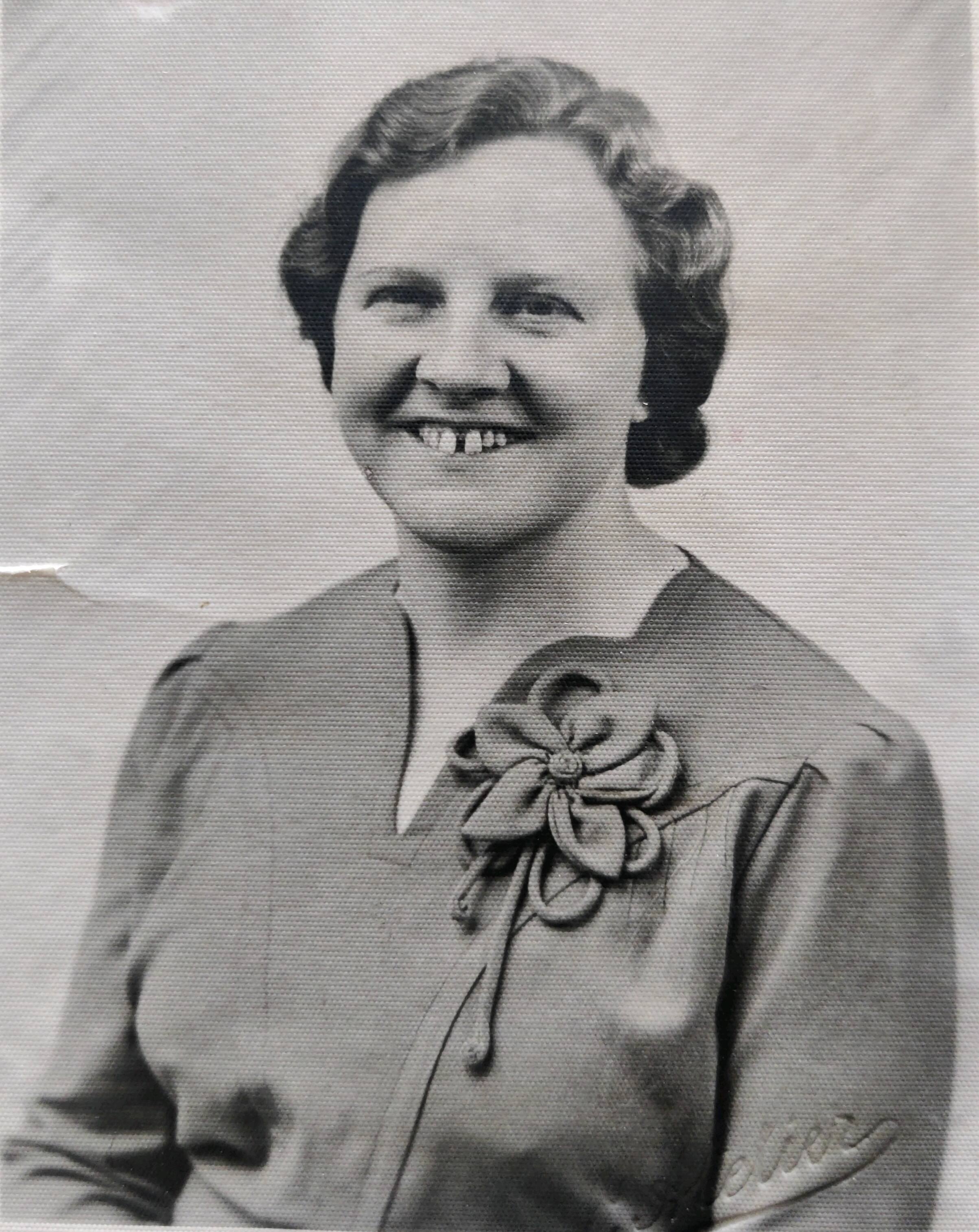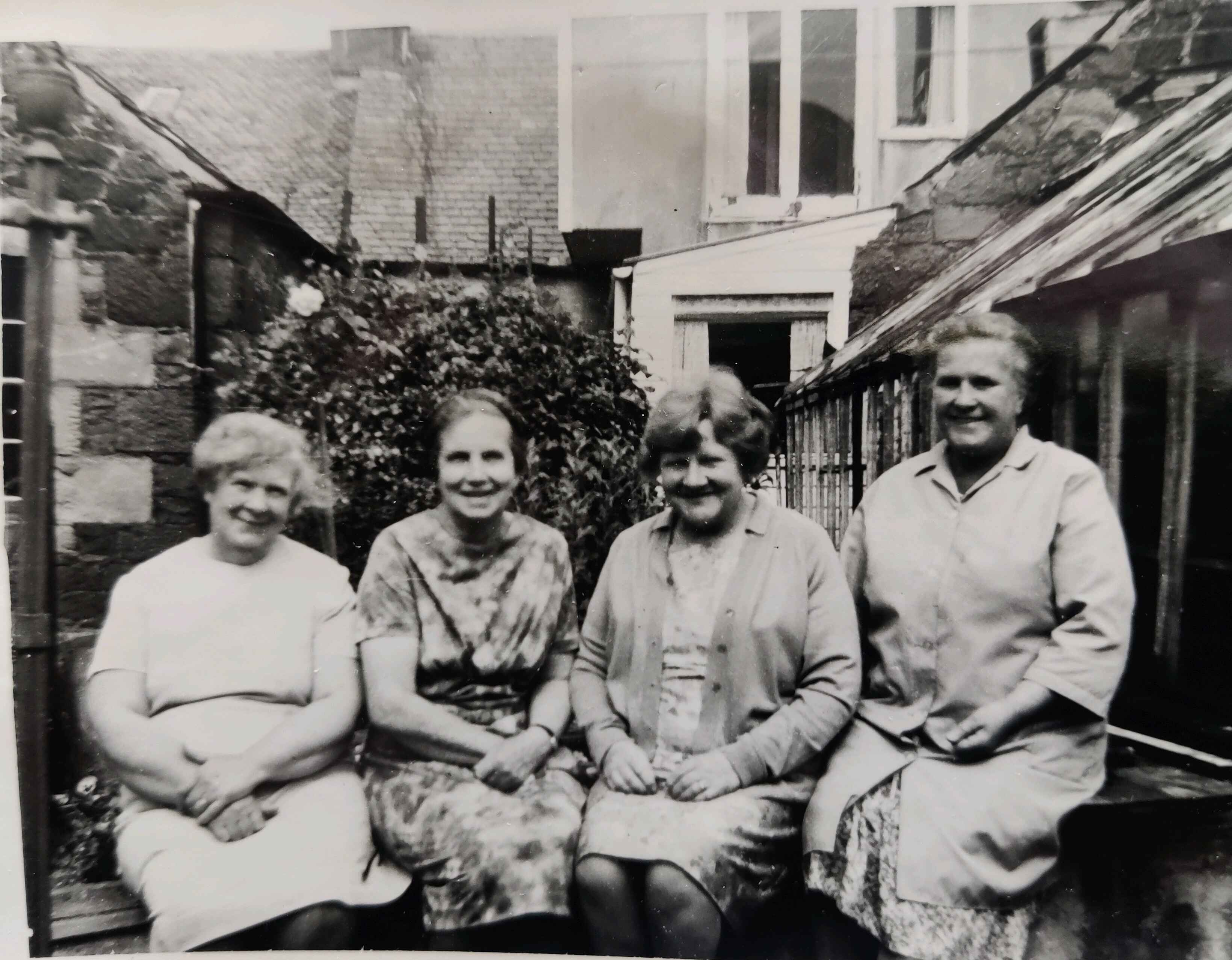Continued from Part 8
In this final part 9 Ina talks about the golden moments and kindness she experienced in the summer holidays she spent in Newburgh in Fife with Auntie Edie and Uncle George in the many years her parents were abroad.
Golden Moments
Most golden moments took place in Scotland. I loved the landscape, the fields, moors, hills/burns and so on. Some supporters of my parents' mission offered them accommodation on their farm. It was a bothy. There was a living room with an open fire and a double bed in the corner. We ate in there, our food being provided by Mary, the farmer's daughter. Porridge and boiled eggs were the norm. Soup was a favourite lunch. We helped collecting eggs, bringing in the cows, attaching the milk machines, cleaning the byres. And when the harvest was on we gathered the corn and wound it round with a stalk of corn and stood several in a stack. It cut the fingers and we were quite glad when the tractor broke down. Someone would come with barley water in the break. In the evening we went back up on the trailer pulled by the tractor and sang 'westering home with the sun in the sky...'. And sometimes I could lie under a tree and read a book - bliss. I had my first try at riding a bicycle there and so did my mother. I only rode on the road when it was empty. As soon as a vehicle came long I hopped off. That was my only experience of a bike. My mother who would have been in mid-late forties also had a go. When my parents returned from Peru we were still invited to go on the school holidays. I was allowed to use their piano tho' not much music. Agnes, Ruth and I went for a walk up the hill behind the farm one day. We went further than we realised and it got dark and we floundered and so we went down to the burn and followed it but that was a long way. Agnes, being fleet of foot, ran on ahead to the farm and I walked with Ruth singing songs to chivvy us along. Lamps eventually appeared to guide us back. That was not a golden moment. Two Glasgow lads were there working - Agnes fancied Norman, I fancied Donald. Quite exciting after our prison. The farm was on the Isle of Arran and we caught the ferry from Ardrossan which was exciting and then got a bus halfway across the island counting the deer on the hills. When we came back from Kenya with Luke 2 years old we rented a place there for a month to introduce Brian and to satisfy my nostalgia.
Time in Newburgh was golden for the most part. We had to do our chores - dust always in a certain order, wash the bathroom floor (I took ages because I took one of my Aunt's magazines with me) but we had lovely cooked breakfasts on Sundays and my aunt used to like experimenting with food - eg she bought a waffle set and we ate waffles for a few weeks. We went up the hill for walks, swinging and hanging upside down on bars halfway up; and we walked along the river and to my uncle's workshop covered in sawdust and machines whirring. He had goats and sometimes we had to milk them - not easy - or catch them when they got away from their leashes. The milk we didn't like too much but the tomatoes and grapes from the greenhouse aren't forgotten. The aroma!
My uncle kept bees and in the summer he would bring the bees down from the heather. The kitchen would be taken up with the extractor as rectangular frames were put in. Then it would be poured into jars - eventually. Very sticky and time-consuming. Our uncle had a workshop with sawdust everywhere and whirring saws and machines. When he was taking a trailer to some site we could sometimes sit in the trailer. If we went into a town we had to hide under the tarpaulin. We loved it. My uncle was a volunteer fireman as were all firemen. The siren would go off and all the volunteers went. The biggest fire was in the linoleum factory. We went down to watch. My uncle was up a massive ladder. Our hearts were in our mouths.
My uncle drove at speed and sometimes he would see rabbits and slow down, open the window and bag one for supper. He was quite wild but also deacon in the baptist church and would wear a homburg to church on Sunday and also had sparkling shoes - polished by us on Saturday night. He liked listening to Chapel in the Valley on Sunday morning. All this was very exciting after our dull school life.
Every summer my uncle's sister-in-law, Meg Aitken, would invite us girls to tea and then to go into her plum orchard and pick as much as we could. She was our uncle's second wife's sister. When Auntie Edie, third wife, came along our visits still continued but when Auntie Edie, good singer, went up to sing a solo in church, Meg walked out. We learned many years later that the house, 37, had been Charlotte's, Meg's sister, and our uncle inherited it on her death.
Every summer there was an agricultural show and there would be motorbikes riding through flaming hoops and through hoops with paper to burst through. Sometimes there was a circus. I loved the trapeze and the high wire.
The visits to our great aunts and being let loose in their garden and having sliders (ice cream wafers) were also golden.
One summer Dorothy Trotman came to stay - how good our Aunt was. We both got jobs but we also had a lovely day in Abernethy, paddling in the burn and exploring. I worked in the linoleum factory and at a restaurant in Perth.

Auntie Edie
The Kindness of Strangers
I have already mentioned the kind farmer folk in Arran who had us for several summers - about a fortnight or so. We were also invited to Liverpool by Mr and Mrs Spratt and their 3 sons. They took us for trips to Speke airport and to a very nice park. The food seemed wonderful to us. I had to lie down with a severe pain after one meal - indigestion, I'm sure. They had 6 young children (there were never the 4 of us) to deal with. No joke. When we were in Newburgh in the summer there were 2 couples from the church who also would invite us to tea - yum yum. Anything with food was heaven. And some friends of my uncle - Mr and Mrs Reid - also had us over for tea. He was a stationmaster. While at school there was the daughter of a missionary colleague of my parents and she would have us to her house for tea from time to time - Myra Herniman. 2 sisters, Fleck, from 'Muchty who had a croquet lawn, would sometimes have us to tea too. Having to be reliant on strangers so often - and grateful I am - it has made me reluctant to accept favours and I feel impelled - but not unwilling - to help others if needed. The adage that 'prophets are without honour in their own country' has been true in my experience. The Irish relatives who could have helped us young girls never lifted a finger. Even Auntie Edie who has been the greatest influence on me and for whom I feel deep affection was not a relative. She was our uncle's third wife and there was no reason for her to take us on at all. At first it was just Beth and me and Beth wrote her a letter and asked us if she would still be having us in the summer. She kept the letter and showed me from time to time and said we had been a blessing to her too. I think it was a mutual relationship - as she was dying the 3 of us still here (not Beth in Brazil) were with her and I went every year to see her and she would get annoyed when I was going back. She said quite seriously they could delay the plane (on one occasion) if I rang [LM I think Ina may mean train here not plane]. 'No, no, never' I said. 'Oh, maybe not in England but in Scotland they will'. It was one time when the other adage 'they reap what they sow' had some truth. She used to foster children from Glasgow - 3 little boys I remember once and 2 babies another time - even when I or others were there. She nursed a dying woman in her house. She picked up the pension of the former minister when he retired and did other errands for him. She had a little choir and she played the church organ from time to time. She organised trips very year for the women's group at church. When her husband became ill she got work - in the office in the factory, in a clothing shop driving a van to deliver goods (what a horror we all thought, not enjoying the experience of driving with her). She took in lodgers as a B&B. She loved mischief and urged us to hang a cotton reel on a thread from our upstairs bedroom so that it would knock on their window and also to tie a string from their bedroom door over the opposite closed bathroom door. When we arrived from school she would say 'happy days are here again' and when we were leaving she would show us how to pack properly and she would be crying. What a difference from Brian's parents. The first time I met his mother Brian and I had been walking round the area with him showing me his school and church and so on. Evidently his mother had asked him to get some bread and he forgot (young 19 year olds we were in love) and she came to the door and told him to go off and get some - in no uncertain terms. I never felt welcome, ever, and no affection was shown to me. I guess my mother and my aunt were both Irish and the Irish are more demonstrative. When Hilda [LM - My Dad's Mum] got old she changed her tune and suddenly expected hugs (had always expected attention). It was hard because I had been held at arms length for so many years.
But how lucky I was but it was also an occasion when you reap what you sow. We were up and down to visit her [LM, Edie] in Newburgh and in Skye and to hospital in Perth and Inverness and when she was dying Beth alone could not be there and I wasn't at the final hours but for nights not long before as well as days - and so were Agnes and Ruth.
Ina's notebook of her childhood stories ends here. Edie's death was effectively the end of this era. Edie was like a mother to Ina.

From the left Auntie Nan, Ruth (Ina's mum), Auntie Edie, and Auntie Izabel. This is how I remember them from visits as a child so this must have been taken when Ina was an adult on a visit to Newburgh, I guess in the 1970s in her 30s. I think this was taken in the back garden in Newburgh
See Introduction and Contents to Ina's story.
My mum wrote about Newburgh again, quite a few years later, and also later again about Uncle George and Auntie Edie